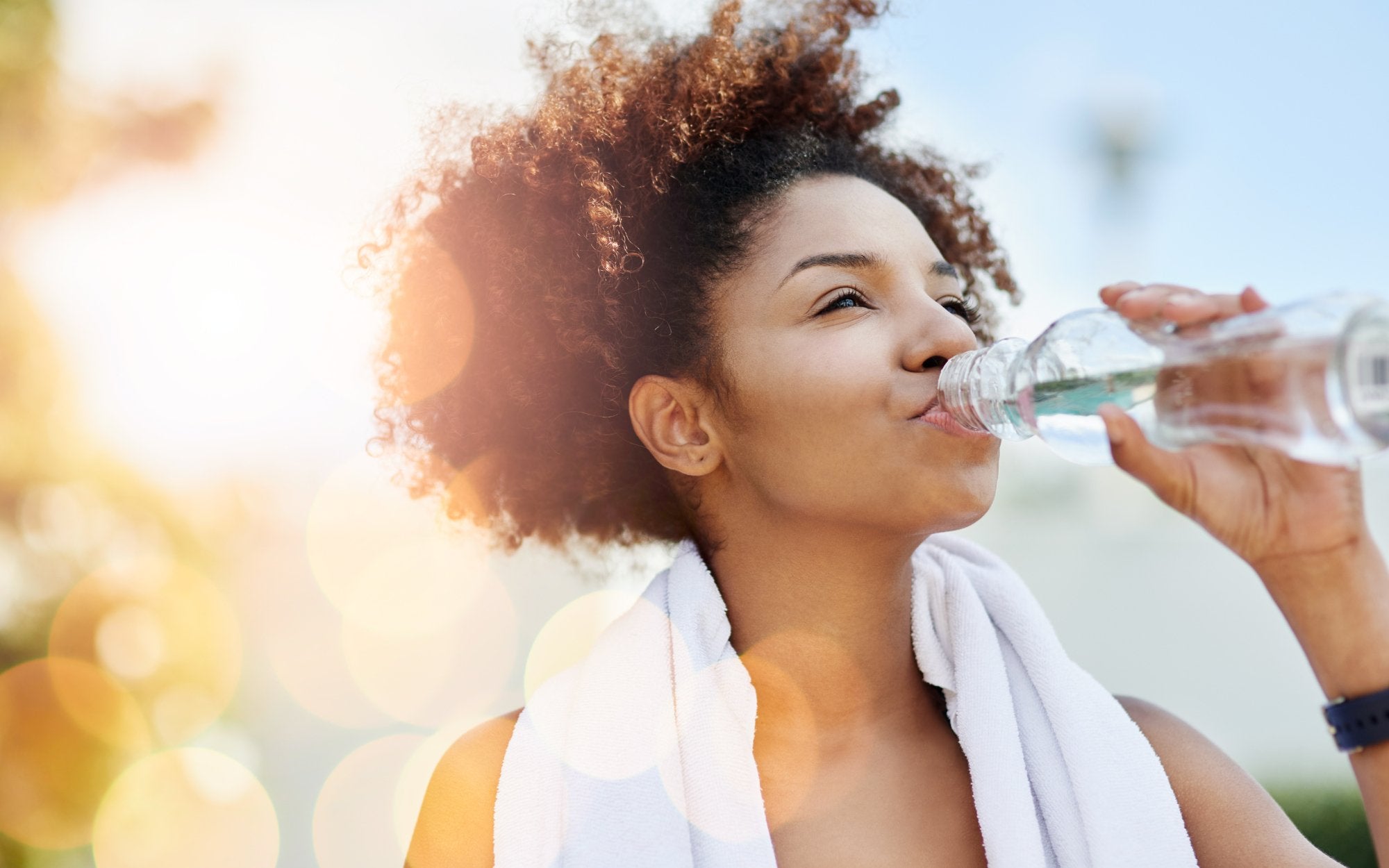How to optimize water intake for better bladder health

Water makes up 60% of the human body. Yep—that’s over half of what makes you you. It’s no surprise then that water is a big part of what keeps your body functioning properly. It regulates your body temperature, lubricates joints, prevents urinary tract infections, and so much more.
Still, staying hydrated and optimizing your water intake can be tough. Here are our top tips for drinking more water and how it can transform your bladder health.
What are the different sources of water?
Staying hydrated isn’t just about having a water bottle handy. There are foods and other fluids that can help fulfill your daily dose of water.
Food typically accounts for 20% of your daily water intake. The best sources of water are fruits and veggies, like berries, melons, apples, pears, oranges, lettuce, celery, spinach, carrots, cooked broccoli, bananas, and avocados.
Other foods can also provide a surprising amount of water. For example, pasta, beans, fish, and chicken breast can have a water content of up to 69%. Even cookies and chocolate have water hiding in them—but don’t get carried away, cookie monsters.
Apart from food, fluids like fresh fruit juice and milk have a high water content and can be a substantial part of your daily water intake.
How much water is recommended per day?
For decades, health authorities have offered a range of water recommendations. These claims have varied over time and location, without much scientific evidence to back them up. What’s more? Bottled water manufacturers often used them to boost sales.
The truth is, the amount of water you need per day depends on so many factors. Your age, the climate you live in, your overall health, how much you exercise—the list goes on. The current US Dietary Guidelines don’t have a recommended daily fluid intake. They do have one reco though: reach for plain old water over sugary juices or flavoured water as much as possible. Sorry to break it to you.
How much water should I drink for my age?
Depending on how old you are, you might need more or less water per day. Here’s a quick guide to help.
- Infants: It’s recommended that infants don’t drink plain water for the first year of life. Their fluid intake should be all breast milk or formula to protect their growing bodies. If you think your baby might need extra hydration on a hot day, they can drink water from a bottle—but only if they’re 6 months or older.
- Kids 1 year or older: This is when good water habits start forming. Encourage your kids to drink water as part of their daily routine, especially on warm summer days. Psst. Water is always a better option than juice.
- Adults aged 19-30: Generally, men should consume 3.7 liters of water per day and women should consume 2.7 liters. If you’re pregnant or breastfeeding, you’ll need to drink a little bit more.
- Older adults: This is where water intake becomes very important. Dehydration can lead to a world of complications if you’re over the age of 60—from urinary tract infections (UTIs) to kidney failures and confusion. Older adults should consume more water to avoid these complications and enjoy other health benefits, like fewer falls, less constipation, and a lower risk of bladder cancer in men.
What role does water play in bladder health and UTI prevention?
Water intake can play a big role in UTI prevention. One 2017 study found that women who suffer from frequent UTIs could avoid infection by drinking 1.5 liters of water per day.
A UTI happens when bad bacteria enters the urinary tract and spreads, causing a world of frustrating symptoms. You might feel a constant urge to pee, a burning sensation down there, or notice your urine looks odd or has a strange odour.
Why does water matter? The amount of water you consume directly impacts your urinary tract. The more you pee, the more bacteria from your urinary tract is flushed out of the body. This stops bacteria from sticking around in the bladder and causing infections.
How can I get better at staying hydrated?
Set specific times to hydrate. Make it a habit to drink water when you wake up, before every meal or snack, and before you go to bed. One study found that people who drank a bottle of water within two hours of waking and two hours before bed boosted their water intake from 44 to 68 oz per day.
Drink more water the more you exercise. There are many factors to keep in mind here: the type of exercise, the intensity, the temperature, your size, and your muscle mass. The overall rule of thumb? Hydrate before and after exercising, and during if you need it. Easy as that.
Add more fruits and veggies to your diet. As we now know, a lot of fresh produce is packed with water. Eating more fruits and vegetables is a sneaky way to stay hydrated without guzzling back glass after glass of water.
Get creative. If plain water is too boring for you, mix up your water intake. Try flavouring your water with fresh fruit or herbs or adding ice to make it more refreshing.
Track yourself with an app or a high-tech water bottle. Free smartphone apps like Water Reminder or Waterllama can send you reminders to drink water throughout the day. You can also get a fancy water bottle that glows when it’s time to drink or tracks your water intake through Bluetooth technology.
How can I optimize my water absorption?
In other words, how can you make the most out of the water you put in your body? Here are a few helpful tips to absorb water faster and more efficiently.
Drink on an empty stomach. This way, water can make its way to your bloodstream in as little as five minutes. When you drink water during or after a meal, it takes longer to pass through your stomach and large intestine.
Add salt. Believe it or not, sodium can help our cells retain water and pass nutrients throughout the body. Even a pinch of salt in your water bottle can give you a boost of hydration.
Get more sleep. This stat might surprise you: sleeping six hours or less per night can increase your chances of dehydration by 59%. Make sure you’re getting the recommended 7-9 hours of sleep per night and try drinking water within two hours of going to bed to avoid dehydration in the morning.
Take your time. When you chug your water too fast, most of it passes through your pee instead of being absorbed into your body. Don’t get us wrong—peeing regularly is really important for a healthy system and UTI prevention. But if you want higher water absorption, make a conscious effort to drink slower.
Boost your fiber intake. This powerful carbohydrate helps your intestines retain more water, so you can stay better hydrated for longer.
Take a UTI supplement. If you want to drink more water to prevent frequent UTIs, taking a high-quality UTI prevention supplement at the same time can help optimize the benefits.
 Utiva Cranberry PACs is an all-natural supplement that is clinically proven to prevent urinary tract infections. Each capsule is bursting with 36mg of proanthocyanidins (PACs)—a powerful active molecule found in cranberries that stops harmful bacteria from sticking to your bladder. Does it work? Ask the 96% of Utiva customers who are UTI-free for at least 6-18 months.
Utiva Cranberry PACs is an all-natural supplement that is clinically proven to prevent urinary tract infections. Each capsule is bursting with 36mg of proanthocyanidins (PACs)—a powerful active molecule found in cranberries that stops harmful bacteria from sticking to your bladder. Does it work? Ask the 96% of Utiva customers who are UTI-free for at least 6-18 months.
Utiva Cranberry PACs has also been recognized by the Society of Obstetricians and Gynaecologists of Canada (SOGC). That means it has been carefully reviewed by a panel of medical professionals to confirm it’s a safe and effective supplement—all based on scientific evidence.
Knowledge is power
Sign up to our newsletter to keep learning!

- Choosing a selection results in a full page refresh.
- Opens in a new window.



